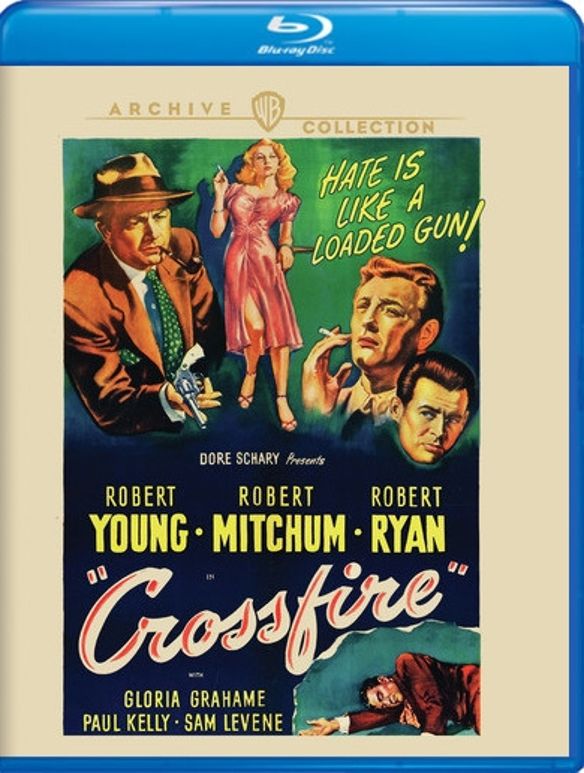
Crossfire, Edward Dmytryk’s 1947 film which crosses classic noir tropes with an anti-racist message, is now getting a nice-looking Blu-ray upgrade from the Warner Archive. The noir elements come across the strongest while the social message aspects are a bit ham-fisted, but the acting is great, and Dmytryk’s steady hand makes it well worth owning.
With World War II over, a group of soldiers sit in a bar wondering what to do with their lives. The brash Montgomery (Robert Ryan) brays and bellows, rants and raves. When he makes one too many disparaging remarks about the Jews, Cpl. Arthur Mitchell (George Cooper), a quiet sort-of fellow, moves to the other side of the bar. A nice man named Joseph Samuels (Sam Levene) follows Mitchell and has a nice chat. He invites him out to dinner, but first, they drop by his place so Samuels’ girl can change clothes. Montgomery and his friend follow the others back to Samuels’ place. What happens next is the film’s central mystery, and it ends in the brutal murder of Samuels.
When the cops arrive, Mitchell is nowhere to be found but Montgomery shows back up at Samuels’ place claiming to be looking for Mitchell. His side of the story has him only staying at Samuel’s place for a few minutes where they found Samuels chatting quietly with Mitchell who was visibly upset and left looking quite distraught. The police, led by Capt. Finlay (Robert Young), suspects Mitchell and brings in his roommate, Sgt. Peter Keeley (Robert Mitchum), for questioning. Keely says Mitchell is not the type of man to hurt anybody much less murder them and he begins his own search for the missing soldier.
What follows is a pretty nifty little film noir full of some nice dialogue, some excellent lighting, and a parcel full of great acting. Also some heavy-handed preaching. Dmytryk allows the story to be told in flashbacks with each suspect getting to tell his side of what happened. When Mitchell is finally found, his version of events begins just like Montgomery’s tale up until they get to Samuels’ apartment. But once there Mitchell notes that Montgomery and his pal stayed longer, drank more, and become increasingly angry. When he left, Montgomery was yelling anti-Semitic slurs at Samuels.
From there, Mitchell says he went to a bar where he met Ginny Tremaine (a magnificent Gloria Grahame), a girl paid to get lonely men to buy her drinks and have a good time. Feeling sorry for him, she gives him the key to her place and tells him she’ll meet him there when she gets off. He sleeps the booze off and wakes to find Ginny’s husband (Paul Kelly) making some coffee. That’s an alibi, maybe, if anybody can remember the time.
Robert Young is terrific as the police captain. He’s a man who has seen it all before. None of this is personal, he’s just doing his job. He’s good at it too. He plays the characters off of each other, manipulating them to help him find the truth. He’s given a couple of monologues toward the end of the film about hate and racism, and they are both poorly written, but he handles them about as well as any actor could. Mitchum plays Keeley like a typical cynical noir character. He too knows the score. He knows cops tend to pin a crime on the first person they can make it stick to regardless of the truth.
For most of the film, the bigotry angle is well done. Montgomery shades his by making comments like “you know how they are” or noting how those people have funny names. But as the film wraps up, it moves towards those heavy-handed monologues. Seeing that the film was made in 1947 and is supposed to have taken place at a similar time period and concerns World War II veterans dealing with antisemitism, I found it strange that no one mentions the Holocaust, but I think that was pretty common for films at the time. Interestingly, the book this film is based upon has the murdered man being a homosexual, not a Jew, but the censors at the time still deemed homosexuality as a deviancy and wouldn’t allow it. Though sharp viewers might see how Samuel is somewhat coded as gay.
Crossfire was one of the first films to tackle antisemitism and helped usher in a new wave of social justice stories. It was a huge hit when it was released and garnered five Academy Award nominations (Picture, Director, Supporting Actor and Actress, and Adapted Screenplay). By focusing on the crime aspects of the story, audiences were more willing to see it and enjoy themselves while also getting the “medicine” of the moral message.
Set for release on 3/30, Warner Archive presents Crossfire with a new 1080p Master sourced from a 4K scan of the original negatives. Extras include an audio commentary from film historians Alain Silver and James Ursini. and an archival featurette about the film. Looking at the film clips shown in that featurette demonstrates how much better this restoration really is.